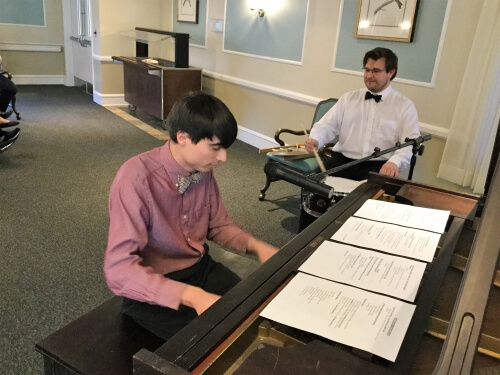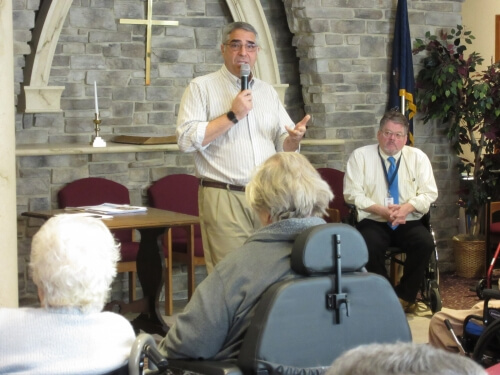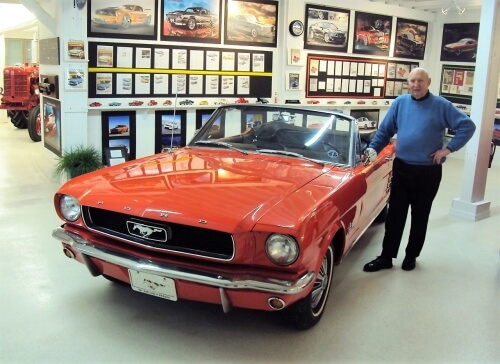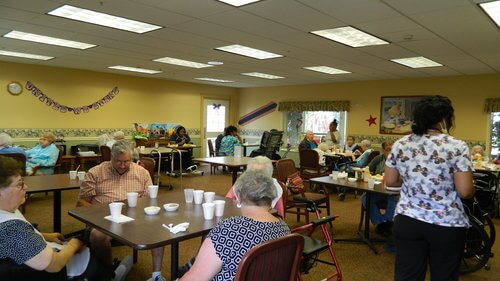Never forget: Homeland Center notes Holocaust Remembrance Day
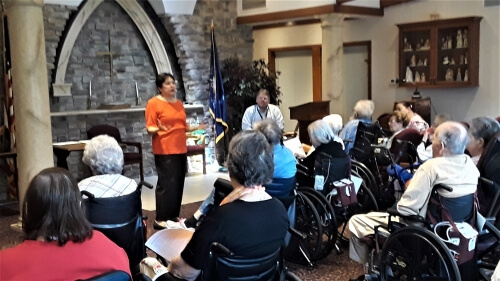
Lillian Rappaport, daughter of Holocaust survivors, shares their story with resident’s at Homeland Center.
At age 20, Lillian Rappaport’s parents hadn’t met yet. Both were living poor but normal lives in the Warsaw-area Jewish villages called shtetls. It all changed in September 1939 when the Nazis invaded Poland, the start of the Second World War.
“Neighbor turned against neighbor,” Holocaust educator Rappaport told Homeland Center residents. “People they were friendly with, people they went to school with, people they socialized with, all of a sudden turned their backs on them, and not just turned their backs but sometimes did more terrible things to them.”
Homeland Center hosted a well-attended Holocaust Remembrance Day program in the Homeland Chapel in early May. The event, part of a Homeland series on the Lessons of Jewish history, reflected global recognition of Holocaust Remembrance Day. The day amplified the voices of survivors and their descendants to ensure that the world never forgets or repeats the time in history when 6 million Jews and 5 million other “undesirables” were systematically slaughtered.

Lillian Rappaport answers questions following her presentation.
“Here at Homeland Center, we surely believe that all of us regardless of our age need to remember,” program organizer and Homeland Hospice Chaplain Dann Caldwell said. Recent synagogue shootings spotlight the need for vigilance against anti-Semitic feelings and expressions that spiral into violence, Caldwell said.
“We need to consider things from our moral, ethical, and historical perspectives,’’ he said. “We need to engage with these issues, to learn again, to never forget, to work as one people to make sure these horrors do not happen again.”
The Holocaust started with small actions in Germany, “the most sophisticated, enlightened country in Europe,” said Rappaport. Germany’s 500,000 Jews and others, including Roma people and the disabled, were “marginalized and excluded.”
But with the invasion of Poland, the Jewish population under control grew by 3.3 million, and the German hierarchy under Adolph Hitler devised a plan of extermination. Within months, Rappaport’s parents were sent to a Nazi ghetto, where entire families were forced to live in single rooms, and starvation and brutality became the norm.
Rappaport’s mother, Genia, plus four siblings and a brother-in-law, were transported to concentration and slave labor camps, but all survived. Family legend says that Genia’s mother knew that God would protect her family because of her devotion to tzedakah, the Jewish concept of giving even if one has almost nothing of one’s own.
“They all weighed about 50 pounds when they were liberated,” Rappaport told the rapt audience. “They survived. Their bodies healed, and they all went on to live good, productive lives.”
Her father, Jacob Weinstock, endured all the horrors of the Holocaust, and as a result, “his soul was injured.” He survived by luck, wits, and talent. By tailoring beautiful uniforms for officers in slave labor camps, he would be rewarded with an extra piece of bread or a potato – the difference between survival and starvation.
As Allied troops were approaching to liberate Buchenwald, Jacob hid in the mud under his barracks for days while guards were killing prisoners in an attempt to silence witnesses. When he finally emerged, the sight of the first black man he ever saw – an African American GI – told him he was free.
He would learn that he was the sole survivor of his family. “No parents, siblings, aunts, uncles, cousins remained,” Rappaport said. All had perished in the camps, or died from starvation days after liberation, or been murdered by Poles.
Jacob and Genia met in a displaced person’s camp. They married, had their first baby, and in 1949, were among about 30 refugee families brought to the U.S. by Harrisburg’s Jewish community. Lillian was born the next year. Jacob opened a tailor shop, known to customers as a jovial and talented businessman.
While Jacob rarely talked about his Holocaust memories, Rappaport knew that it “never left my father’s soul.” On her wedding day, as her parents walked her down the aisle, Rappaport realized her father was crying.
“Look at all the people who aren’t here,” he said.
Today, Rappaport is religious school principal for Temple Ohev Sholom, Harrisburg, and Holocaust educator for the Jewish Federation of Greater Harrisburg. She has completed special training in Holocaust education at Yad Vashem Holocaust Institute in Jerusalem.
Homeland resident Pat Myers called the program “very informative. Vey heart-wrenching.” The Holocaust “teaches us an awful lesson,” she said, but Rappaport “has it right on the button. Somebody’s got to tell the story. We all have to think of each other.”

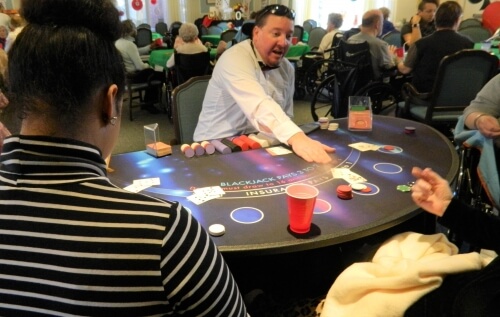
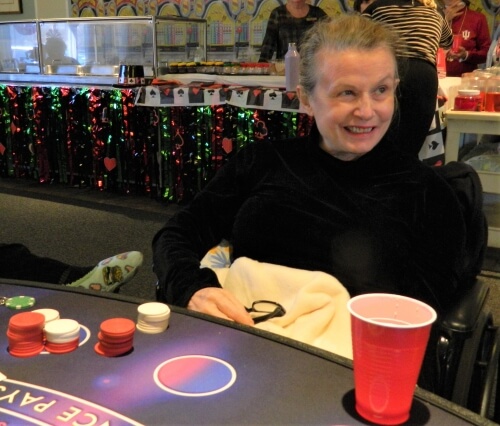 At the blackjack table, chip value ranged from a pretend $50 to $1,000, depending on the color. Round after round, resident Sandy Friedman let all her chips ride until her stash ballooned to $1,600.
At the blackjack table, chip value ranged from a pretend $50 to $1,000, depending on the color. Round after round, resident Sandy Friedman let all her chips ride until her stash ballooned to $1,600.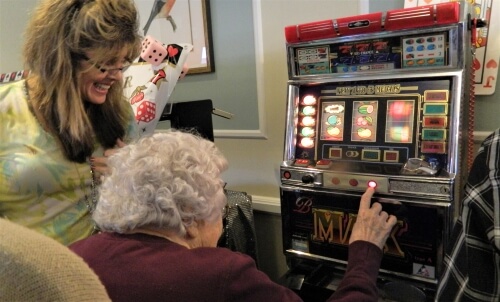 All the residents came away winners and used their chips to select prizes from a table loaded with candy, puzzle books, and stuffed toys.
All the residents came away winners and used their chips to select prizes from a table loaded with candy, puzzle books, and stuffed toys.

